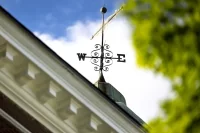2007 Martin Luther King Jr. Day Workshops
The following workshops will be held in Pettengill Hall, Monday, Jan. 15:
Session I, 1:15 to 2:35 p.m.
1. “Darwin’s Nightmare”
Pettengill G65
Film screening and discussion of Hubert Sauper’s documentary about humans and fish that explores the exploitation of several continents. (This workshop spans Sessions I and II.)
Convened by: Charles Nero, associate professor of rhetoric
2. “Claiming Open Space”
G21
Screening and discussion of Austin Allen documentary that explores African American culture as it clashes with the design of the modern American city. The film is both a critical examination of the design and histories of American urban open spaces, as well as a celebration of leisure, recreation and resistance. Questions to be discussed include issues regarding the design and use of open space, in relation to race, class and gender, in and around Bates and the wider Lewiston/Auburn community. (This workshop spans Sessions I and II.)
Convened by: Jonathan Skinner, assistant professor of environmental studies
3. Rain in a Dry Land
Keck Classroom (G52)
Film screening and discussion of Anne Makepeace’s Emmy Award-winning documentary about two remarkable families — refugees from the 1991 civil war in Somalia — who find new homes in urban America. The Somali Bantu refugee families are followed from Somalia, to Kenya, to the United States, where they make their final transition to a new way of life in Springfield Mass., and Atlanta, Ga. (This workshop spans Sessions I and II.)
Convened by: Elizabeth Eames, associate professor of anthropology
4. “A Time to Break Silence: Reflections on MLK Jr.’s thoughts on the Vietnam War. What lessons do they hold for us today?”
G50
Convened by: Sue Houchins, associate professor of African American studies and special assistant to the President; Melinda Plastas, visiting assistant professor of women’s studies; Ana Nicole Rodriguez, Bates Class of 2009
5. “The Iraq War: A Historical Perspective”
G63
Convened by: Chris Beam, lecturer in history
6. “Nonviolence as a Way of Life”
G54
Convened by the Rev. Ruby Sales, civil rights activist and guest preacher for the 2007 Annual Martin Luther King Day Memorial Service of Worship.
7. “Immigration: A Matter of Citizenship or Personhood?”
G10
Convened by: Bates seniors Vaibhav Bajpai, Ben Chin and Mariah Pfeiffer
8. High School Civil Rights Team Roundtable
162
Local high school students offer insights about race and civil rights in their schools.
Convened by: Joe Hall, assistant professor of history
Session II: 2:55 to 4:25 p.m.
9. “Walking the Edge: About Borders”
162
As we move into the 21st century, borders have become contested spaces. Some see them as clear delimitations separating one nation from another and protecting nations from “outsiders.” Yet for others, they represent a dangerous place of crossing. Borders are not only barriers, but spaces of transition, intercultural contact and connection. This panel examines issues about social justice, human community and the “edge” of the border in the Southwest United States, the U.S.-Canadian border and border zones in France and the European Union.
Convened by: Claudia Aburto-Guzman, associate professor of Spanish; Alexandre Dauge-Roth, assistant professor of French; and Mary Rice-Defosse, professor of French
10. “The Criminalization of the Black Individual: Has Bates/America Gone Too Far?”
G54
This discussion will focus on America’s continuing practice of portraying black individuals as criminals. Bates College is not excluded from this practice, and the effects of relatively recent measures occurring on campus will be examined in order to shed light on the issue. The panel will conclude with a discussion of possible methods of minimizing and eradicating the mass criminalization of blacks in the United States, and at Bates in particular.
Convened by: Amandla!, the African American student organization at Bates
11. “Realities of Educational Inequity”
G50
A discussion of the current state of American schools that are more segregated, separate and unequal than before the landmark 1954 Brown v. Board of Education decision.
Convened by: Ed Smith, recruitment director, Teach for America
12. “Chaos as Community: Jazz and African American Culture in the 1960s”
G63
During the 1960s, jazz artists responded to the turbulence of contemporary events in a variety of ways. Jazz served as a source of human connection during a period of historical upheaval in the United States., building communities both in the face of chaos and by embracing it. This presentation will explore the music of artists as diverse as Cannonball Adderley, John Coltrane, Duke Ellington, Charles Mingus and Sun Ra in order to understand the powerful ways in which the music of the time embodied and represented human togetherness.
Convened by: Dale Chapman, assistant professor of music, and Tom Hayward, humanities reference librarian
13. “Where Chaos and Community Intersect: How New Science Informs Leadership – Lessons from Business, Religion and Diversity Communities”
116
Convened by: Charlotte Lehmann, research technician, geology; P.J. Mears, New Balance Shoes
14. “The Love Ethic of the Rev. Martin Luther King Jr.”
G10
The Rev. Martin Luther King Jr.’s work was enabled and empowered by his theology of love and depth of love.This theology enabled him to live in freedom and spiritual vibrancy in the midst of suffering, injustice and oppression.This seminar will examine King’s theology of love and challenge each of us to love even those with whom we most strongly
disagree, as a means to social transformation.
Convened by: Bill Cutler, associate chaplain, Bates Christian Fellowship, and Tim Clayton, Elethuro (a Christian community that explores the interaction of Christian spirituality and theology with environmental ethics and issues of justice for the poor)
MLK Book Club Discussion, 4:30 to 5:30 p.m.
Pettengill, Keck Classroom (G52)
Author Cleveland Sellers leads a discussion of his book, The River of No Return: The Autobiography of a Black Militant and the Life and Death of SNCC. Books are available in the College Store, and reserved readings of Chapters 4 and 12 (the focus of the discussion) are available at the Ladd Library Circulation desk.



